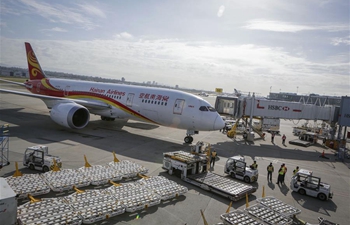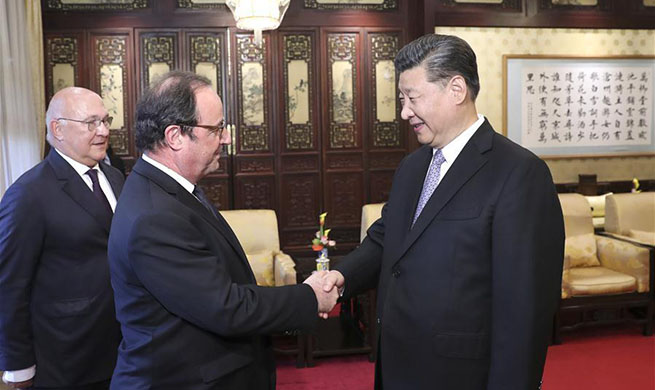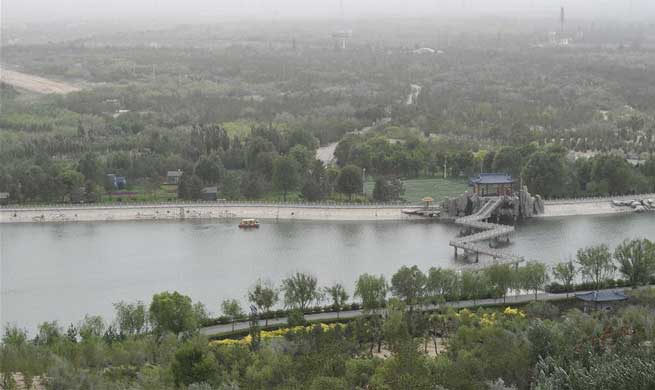BEIJING, May 26 (Xinhua) -- It took only 20 years for Beijing-based Leyard Group to become a world leading LED screen producer.
Headquartered in Beijing's high-tech base Zhongguancun, the company has 14 percent of the world's LED screen market, with its products seen at the opening ceremony of the Beijing Olympics, the 2015 military parade in Beijing and the APEC summit.
The company saw its net profit surge to 1.2 billion yuan (188 million U.S. dollars) in 2017, more than 10 times the volume in 2012 when it was listed.
Li Jun, founder and president of the group, says the key to success is innovation, for which Zhongguancun is renowned.
"Once you are in the atmosphere here in Zhongguancun, you will be driven to entrepreneurship and innovation," says Li, adding that a breakthrough in small spacing LED displays had reduced the unit cost of LED lights from over 2 yuan to around 2 cents.
Located in Haidian District, home to numerous universities and research institutions, Zhongguancun initially took shape for electronics sales in 1978, when China started its reform and opening-up drive.
Over the past four decades, the area has developed into an aggregation base for high-tech entrepreneurs and innovators as Beijing has vowed to build it into a national center of innovation.
In 1978, Chinese leadership announced at a national conference on science that "science and technology is productivity." A reform and opening-up drive was introduced later that year, revitalizing the country's economy.
Liu Chuanzhi, founder of China's PC giant Lenovo Group, remembers how the country lagged behind Western countries in computer technology back then.
"When the developed countries were using the 386-model computers, they only sold the lower model of 286 to China," Liu said.
Liu and his team started their business at the doorkeeper's room of the Institute of Computing Technology at the Chinese Academy of Sciences 34 years ago.
Now, the group has secured an annual revenue of 300 billion yuan, becoming an icon of Zhongguancun, as well as China.
In 1988, the State Council approved the establishment of a new technology development pilot zone in Zhongguancun to support its development. Preferential measures were offered, such as lower tax and bank loan support.
"On hearing the measures, I was thrilled," said Wang Wenjing, a former civil servant who attended the inauguration ceremony of the zone and has started his own business.
His software service company Yonyou is now known for its cloud services, with 15,000 workers.
In 1999, the State Council approved the establishment of a management committee for Zhongguancun Science Park. In 2009, Zhongguancun was approved as a national demonstration area for innovation.
More government measures have been introduced over the years to encourage entrepreneurship and innovation.
In 2011, Zhongguancun set up an angel capital guiding fund, which then started 17 funds with renown investors. It is estimated that there are now over 10,000 active angel investors in Zhongguancun, offering strong support to mushrooming high-tech startups.
"The total investment of dozens of billion dollars Xiaomi had received in the first five years were all from investors in Zhongguancun," said Lei Jun, CEO of mobile and smart device producer Xiaomi based in Yingu Mansion of Zhongguancun.
Founded in 2010, Xiaomi saw over 100 billion yuan of revenue in 2017.
The number of high-tech businesses in Zhongguancun has reached more than 20,000, with 300 of them listed. In 2017 alone, nearly 30,000 companies were established, which means nearly 80 businesses were registered every day. Companies registered in Zhongguancun reported total revenue of more than 5 trillion yuan and were granted 43,000 patents in 2017.
Li Jun from Leyard said numerous talent, abundant information, powerful R&D and innovation had made Zhongguancun outperform other places, setting an example for the entire country.
"Companies are cells of our country, and the deepening reform and opening-up drive has been eliminating development barriers, with companies being the biggest beneficiaries and supporters," he said.

















